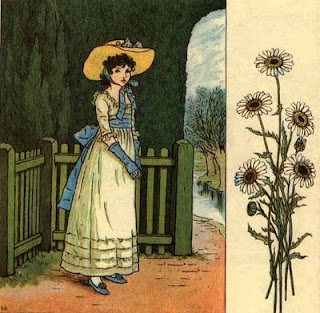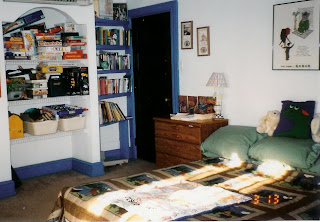Back in the days when I was learning Alexander Technique in hopes of eliminating tendonitis in my right elbow, I also dabbled in Occupational Therapy. I was assigned to a young (20 - something) occupational therapist named Robert who helped me not only with my aching elbow but also with turning off the bad tapes in my head.
When he would ask me to gauge my own progress, I would say, "Well, it still doesn't feel like the left elbow" or "When will it return to how it used to be?" He would very patiently remind me that these were not the right responses. "Give me another answer" he would say, or "Ask me a different question. We're not trying to go backwards here, we're going forward."
I used to wonder, how did he get to be so wise? I asked him if he had thought of going back to grad school in psychology and becoming a counselor. Here he was so young and healthy and level - headed, surrounded by all these whining, aging, wounded complainers, yet he never became exasperated, never lost hope that we were all going to improve -- and we did! There was the mail carrier whose shoulder had started aching in such a way that he could no longer play his jazz trombone without pain; the cyclist who most tragically had lost half a finger in a hand-brake accident (we all grieved for her loss); the woman with carpel tunnel who was frustrated by buttons and zippers; the man who could not remember being thrown from his motorcycle (had he been wearing a helmet?); and me with my elbow. We brought all our troubles to the table. We commiserated, we focused, and eventually we improved!
After several weeks, Robert told me I needed an appointment with the elbow specialist for a recheck. I made a negative face, and he said, "Why not?" I explained to him that this particular orthopedic surgeon had diagnosed me as getting old and prescribed accepting that fact. Nothing more to do for me, no medication, no suggestions. Just live with it. Robert, in his helpful way, said, "That's not true. You don't have to believe that. You
do need to see a doctor, but it doesn't have to be him. Pick someone different."
See what I mean? Robert just had the right tapes going in his head and he nudged me to re-train my own thought patterns. Thank you Robert! His view of practicing occupational therapy serves equally well as a philosophy of life. His focus was on training the patient to live in the present and turn off the unhelpful repeating decimal "if only" tapes, otherwise known as "hey, let's rewrite the past." Yes, it is okay to mourn for what is not coming back; but our goal lies ahead not behind. In fact, we
cannot go back. Forward is the only way, even if it means embracing uncertainty.
At the turning point of my improvement, I came up with a polite suggestion for my right arm when I realized that I had been (for god only knows how long) holding it out from my body, ever so slightly, penguin style, as if I were carrying a book in my hand. I tried to retrain the arm to hang more naturally, by whispering gently under my breath, "You're not carrying anything." Then I changed the instruction to "Stop doing that" -- just a gentle reminder, never bossy. If there's one thing I learned from the Alexander Technique, it's that my body and my mind are one entity, not two; so I needn't do anything to hurt its -- well, make that
my feelings. Likewise,
A Course in Miracles advises that "The body appears to be largely self-motivated and independent, yet it actually responds only to the interventions of the mind."
Shortly after devising my mantra of "Stop doing that," I read
Just Play Naturally, by famous cellist, Vivien Mackie, who used the Alexander Technique to improve her musicianship. I was delighted to read that her message to herself, whenever she felt the stress mounting before a performance, was "Just stop all that!" That gave me confidence that telling my arm to "Stop" was the right approach!
Then, to clinch the idea for me, along came an e-mail from one of my reading buddies, recommending the book
Embracing Uncertainty: Breakthrough Methods for Achieving Peace of Mind When Facing the Unknown (Susan Jeffers) and explaining her latest approach to quieting the worry tapes in her head: "Stop Stop Stop." You can't get any more straightforward than that. Perhaps that's what our psyches are waiting to hear:
Stop Stop Stop! Just stop all that! Stop doing that!
For more on Vivien Mackie & other
books about the Alexander Technique
READ THE LATEST POST ON MY BOOK BLOG:
"ALEXANDER TECHNIQUE & INNER QUIET"
KITTI'S BOOK LIST
www.kittislist.blogspot.com
and my list on amazon.com
Listmania

%2520-%2520ca%25201877.jpg)
























